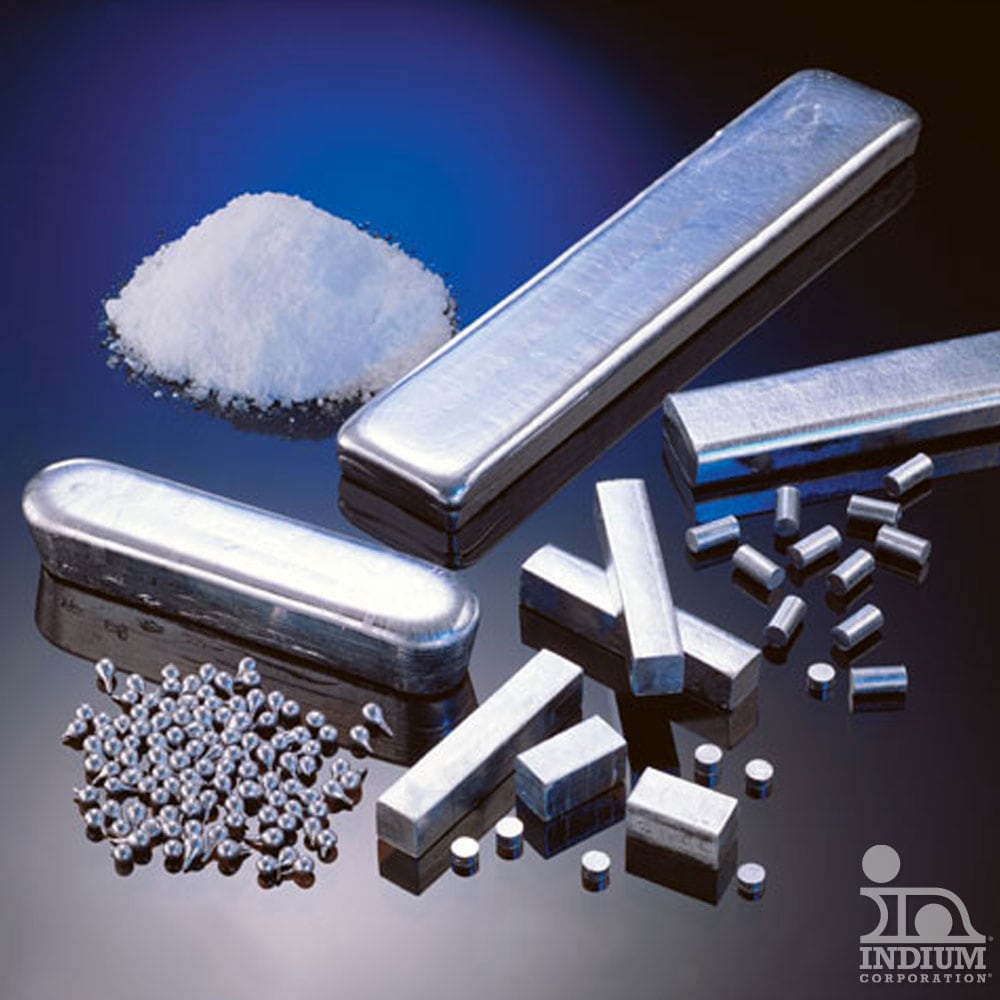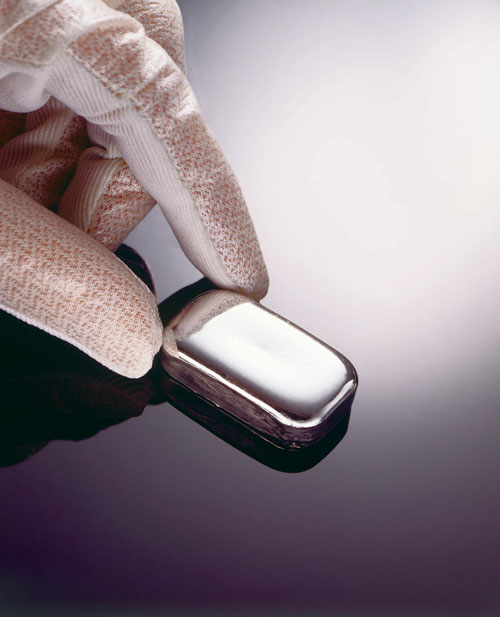Since gallium and gallium alloys are generally liquid at room temperature, they are not generally used for solder applications, but find a home with thermal applications. Gallium is also a replacement for the mercury (Hg) in batteries.
| Indalloy® # |
Composition |
Liquidus/Solidus Temperature (°C) |
| 51E |
66.5Ga/20.5In/13Sn |
11 Eutectic |
| 300E |
78.6Ga/21.4In |
15.7 Eutectic |
Most bismuth alloys are considered low-temperature and many of them are Pb-free. Although bismuth is considered to be fairly brittle, BiSn and BiSnAg are widely used in step-soldering applications and other applications where a lower temperature is required.
Please scroll right to view all available information.
| Indalloy® # |
Composition |
Liquidus/Solidus Temperature (°C) |
Solidus Temperature (°C) |
| 281 |
58Bi/42Sn |
138 Eutectic |
| 282 |
57Bi/42Sn/1Ag |
140 |
139 |
Indium is a very versatile metal, often used for soldering to gold, thermal applications, low-temperature solders, bonding to ceramics, hermetic and cryogenic sealing, and CTE mismatch.
| Indalloy® # |
Composition |
Liquidus/Solidus Temperature (°C) |
Solidus Temperature (°C) |
| 1E |
52In/48Sn |
118 Eutectic |
| 1 |
50In/50Sn |
125 |
118 |
| 290 |
97In/3Ag |
143 Eutectic |
| 2 |
80In/15Pb/5Ag |
154 |
149 |
| 4 |
100In |
157 Melting point |
| 204 |
70In/30Pb |
175 |
165 |
| 205 |
60In/40Pb |
181 |
173 |
| 227 |
77.2Sn/20In/2.8Ag |
187 |
| 7 |
50In/50Pb |
210 |
184 |
| 3 |
90In/10Ag |
237 |
143 |
| 164 |
92.5Pb/5In/2.5Ag |
310 |
300 |
Tin is the basis for most electronics grade solders. It has excellent wetting, but is not recommended for soldering to thick Au-plating since the tin will leach or scavenge the gold. Adding antimony (Sb) to tin will give higher creep strength at temperatures up to 100°C.
| Indalloy® # |
Composition |
Liquidus/Solidus Temperature (°C) |
Solidus Temperature (°C) |
| 106 |
63Sn/37Pb (Sn63) |
183 Eutectic |
| 121 |
96.5Sn/3.5Ag |
221 Eutectic |
| 133 |
95Sn/5Sb |
240 |
237 |
| 256 |
96.5Sn/3Ag/0.5Cu (SAC305) |
220 |
217 |
Lead
Alloys containing lead are not RoHS-compliant, so alternatives are being sought to replace the SnPb alloys of the past. Several applications require higher temperatures and can still use lead.
| Indalloy® # |
Composition |
Liquidus/Solidus Temperature (°C) |
Solidus Temperature (°C) |
| 151 |
92.5Pb/5Sn/2.5Ag |
305 |
298 |
| 164 |
92.5Pb/5In/2.5Ag |
310 |
300 |
Gold is considered a noble metal and can be used in fluxless reflow environments. Pure gold has a melting point of 1,064°C but can be alloyed with tin (Sn), silicon (Si), or germanium (Ge) for lower melting points. 80Au/20Sn, a eutectic alloy is by far the most popular gold-based alloy.
| Indalloy® # |
Composition |
Liquidus/Solidus Temperature (°C) |
Solidus Temperature (°C) |
| 182 |
80Au/20Sn |
280 Eutectic |
| 183 |
88Au/12Ge |
356 Eutectic |
| 184 |
96.8Au/3.2Si |
363 Eutectic |
| 200 |
100Au |
1,064 Melting point |
Since gallium and gallium alloys are generally liquid at room temperature, they are not generally used for solder applications, but find a home with thermal applications. Gallium is also a replacement for the mercury (Hg) in batteries.
Please scroll right to view all available information.
| Indalloy® # |
Composition |
Liquidus/Solidus Temperature (°C) |
| 51E |
66.5Ga/20.5In/13Sn |
11 Eutectic |
| 60 |
75.5Ga/24.5In |
16 Eutectic |
Most bismuth alloys are considered low-temperature and many of them are Pb-free. Although bismuth is considered to be fairly brittle, BiSn and BiSnAg are widely used in step-soldering applications and other applications where a lower temperature is required.
Please scroll right to view all available information.
| Indalloy® # |
Composition |
Liquidus/Solidus Temperature (°C) |
Solidus Temperature (°C) |
| 281 |
58Bi/42Sn |
138 Eutectic |
|
| 282 |
57Bi/42Sn/1Ag |
140 |
139 |
Indium is a very versatile metal, often used for soldering to gold, thermal applications, low-temperature solders, bonding to ceramics, hermetic and cryogenic sealing, and CTE mismatch.
Please scroll right to view all available information.
| Indalloy® # |
Composition |
Liquidus/Solidus Temperature (°C) |
Solidus Temperature (°C) |
| 1E |
52In/48Sn |
118 Eutectic |
|
| 1 |
50In/50Sn |
125 |
118 |
| 290 |
97In/3Ag |
143 Eutectic |
|
| 2 |
80In/15Pb/5Ag |
154 |
149 |
| 4 |
100In |
157 Melting point |
|
| 204 |
70In/30Pb |
175 |
165 |
| 205 |
60In/40Pb |
181 |
173 |
| 227 |
77.2Sn/20In/2.8Ag |
187 |
|
| 7 |
50In/50Pb |
210 |
184 |
| 3 |
90In/10Ag |
237 |
143 |
| 164 |
92.5Pb/5In/2.5Ag |
310 |
300 |
Tin is the basis for most electronics grade solders. It has excellent wetting, but is not recommended for soldering to thick Au-plating since the tin will leach or scavenge the gold. Adding antimony (Sb) to tin will give higher creep strength at temperatures up to 100°C.
Please scroll right to view all available information.
| Indalloy® # |
Composition |
Liquidus/Solidus Temperature (°C) |
Solidus Temperature (°C) |
| 106 |
63Sn/37Pb (Sn63) |
183 Eutectic |
|
| 121 |
96.5Sn/3.5Ag |
221 Eutectic |
|
| 133 |
95Sn/5Sb |
240 |
237 |
| 256 |
96.5Sn/3Ag/0.5Cu (SAC305) |
220 |
217 |
Lead
Alloys containing lead are not RoHS-compliant, so alternatives are being sought to replace the SnPb alloys of the past. Several applications require higher temperatures and can still use lead.
Please scroll right to view all available information.
| Indalloy® # |
Composition |
Liquidus/Solidus Temperature (°C) |
Solidus Temperature (°C) |
| 151 |
92.5Pb/5Sn/2.5Ag |
305 |
298 |
| 164 |
92.5Pb/5In/2.5Ag |
310 |
300 |
Gold is considered a noble metal and can be used in fluxless reflow environments. Pure gold has a melting point of 1,064°C but can be alloyed with tin (Sn), silicon (Si), or germanium (Ge) for lower melting points. 80Au/20Sn, a eutectic alloy is by far the most popular gold-based alloy.
Please scroll right to view all available information.
| Indalloy® # |
Composition |
Liquidus/Solidus Temperature (°C) |
| 182 |
80Au/20Sn |
280 Eutectic |
| 183 |
88Au/12Ge |
356 Eutectic |
| 184 |
96.8Au/3.2Si |
363 Eutectic |
| 200 |
100Au |
1,064 Melting point |



